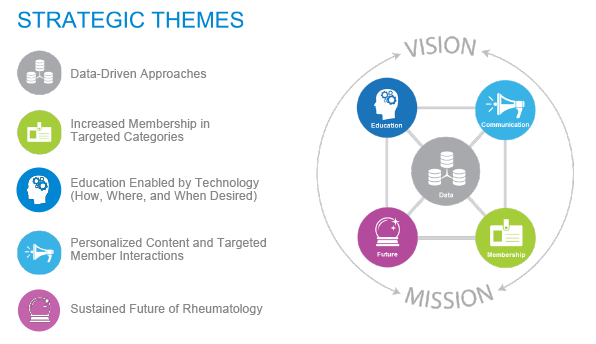Rheumatology is at a critical juncture in our history. To advance into the future, the ACR must thoroughly prepare for changing political landscapes, emerging technologies and workforce challenges.
On May 12, the ACR Board of Directors met in Washington, D.C., to approve our ambitious new Strategic Plan for 2017–2022. This plan encompasses five strategic themes with quantifiable measurements, specific goals and detailed timelines.
This has been a true team effort. The Strategic Plan Task Force engaged in ideation workshops and member surveys to gather ideas and input, including a work session at the January Leadership Development Conference in Atlanta. We engaged Slalom, a consulting agency, to help us with this colossal endeavor.
Data-Driven Plan
Why should you be excited about our new strategic plan? For one, this plan is highly data driven. A strategic plan must be much more than a collection of lofty ideas on paper. We cannot merely hope to wind up halfway to our goals somewhere down the road. We face real challenges in uncertain, competitive times, so we must harness big and small data, craft truly strategic goals and incorporate incremental steps and ambitious timelines so we are where we need to be in five years.
Here are the five strategic themes the ACR board, staff and members will ambitiously pursue over the next five years:
- Data-Driven Approaches
We will incorporate data into our operations and mission-focused endeavors. We will expand and refine RISE, which is a CMS-approved, qualified clinical data registry. It already includes data on over 1 million patients, including more than 5 million patient encounters and growing. We will improve RISE to increase access and enrich its research applications. - Increased Membership in Target Categories
The ACR must launch and complete a sophisticated needs assessment and engage in strategic marketing campaigns and membership drives. We are setting ambitious goals to expand and diversify our ranks. - Education Enabled by Technology (How, Where & When Desired)
Medical education no longer exists just in the classroom or conference hall. Technology enables us to expand our educational offerings and make them more convenient to access. We will strive to create more offline and mobile-friendly education so rheumatologists and rheumatology health professionals can learn on the go wherever they work or live. - Personalized Content & Targeted Member Interactions
We will develop an advanced member management tool, as well as more targeted news, education and communications to our members so they are more meaningful and personalized. - Sustained Future of Rheumatology
We must develop cutting-edge approaches to address our workforce gap and develop diverse leadership. We must also aggressively pursue advocacy goals for our members and ensure that our impact on rheumatology research is unparalleled in the world of medicine.
Strategic, Not Functional
One important distinction to note is that this is a strategic, rather than a functional, plan. A strategic plan clarifies our organizational priorities and provides focus. It is organization wide, not defined by our current organization design or staffing.
It has a long-term vision, including goals to be completed over a five-year timeline. A functional plan reassesses and changes goals every year. We need to be more ambitious. Objective measures will be reviewed monthly by Mark Andrejeski, our executive vice president, and quarterly by the ACR Board of Directors. Most importantly, this plan was developed with shared input from stakeholders across our organization. Each voice was taken into equal consideration. Instead of a functional plan for the day-to-day management of the ACR, our plan is a strategic, multipronged pursuit of our organization’s mission and values.

5 Years, Not 3
I was one of the co-chairs of the task force that created our previous strategic plan, which wrapped up this year. Why does this new strategic plan span five years instead of three, as we have done in the past? Our current goals simply take longer to pursue and accomplish. With more time to implement, test and fulfill our goals, we can afford to be more ambitious and take the time and energy necessary to complete meaningful objectives that will truly advance rheumatology well into the 21st century.
Metrics Keep Us on Track
Another essential element of our new strategic plan is the inclusion of detailed metrics. We are not just checking boxes. We have created ways to measure each accomplished task to ensure its value. We are committed to working as a team so everyone has equal input and accountability.
The next steps include finding our new Association Management Software Tool, which must meet requirements included in our plan. This tool will facilitate communication among our members. The right software will make it easier for us to achieve our ambitious objectives as a team.
Three important, fresh elements of our new Strategic Plan are our new mission statement, vision statement and brand promise. Each reflects where the ACR is now and where we are headed in the future:
New Mission Statement: The ACR empowers rheumatology professionals to excel in their specialty.
New Vision Statement: As the leading authority and trusted partner of rheumatology professionals, the ACR will continually advance the specialty and the future of rheumatology.
New Brand Promise: We are here for you, so you can be there for your patients.
The 2017–2022 ACR Strategic Plan is a detailed, data-driven roadmap to rheumatology’s future. We developed this plan with input from every stakeholder in our organization, including those in private practice, bench research, academia and community hospitals, and people at all stages of their careers, from fellows to masters.
I want to thank the members of the Strategic Plan Task Force, which included members of the Executive Committee, Board of Directors, committee chairs and members at large from both academia and clinical work settings.
I want to thank the always supportive and flexible ACR and ARHP staff, as well, for their conscientious assistance.
Your input and engagement is welcome as we put the plan into action. Follow Rheumatology or your e-newsletters (ACR@Work and ACR eNewsRheum) for updates. Give us your feedback. Sign up for volunteer roles in the area that appeals most to you. Together, we will empower rheumatology professionals to excel in our specialty and use a strategic, data-driven, metrics-measured approach to reach our goals in five years.

Sharad Lakhanpal, MBBS, MD, is in private practice at Rheumatology Associates and a clinical professor of internal medicine at the University of Texas Southwestern Medical School, both in Dallas, where he has lived and worked since 1986. He is also the 80th president of the ACR (2016–17).
Strategic Plan Task Force
Task Force Co-Chair
Jane Kang, MD, MS;
Task Force Co-Chair
Charles King II, MD;
Abby Abelson, MD;
Stacy Ardoin, MD;
Joel Block, MD;
David Daikh, MD, PhD;
Sarah Doaty, MD;
Afton Hassett, PsyD;
Mike Holers, MD;
Tim Laing, MD;
Paula Marchetta, MD, MBA;
Zsuzsanna McMahan, MD, MHS;
Chris Mecoli, MD;
Eli Miloslavsky, MD;
Sandra Mintz, MSN, RN;
Seetha Monrad, MD;
Melissa Griffith, MD;
Jennifer Horonjeff, PhD;
Gabriela Schmajuk, MD, MS;
Swamy Venturupalli, MD;
Zach Wallace, MD;
Kelly Weselman, MD;
Doug White, MD, PhD;
Angus Worthing, MD; and
Sharad Lakhanpal, MBBS, MD.
